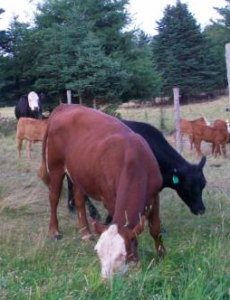Low Stress Cattle Handling Workshop and Pasture Walk, 7/20/2019
 Saturday, July 20th
Saturday, July 20thNoon to 3 pm
Shaw Road
283 Shaw Road
Dover-Foxcroft
Free lunch included.
Attendees will hear a presentation on reducing stress in cattle by Colt Knight, UMaine Extension Livestock Specialist with a live demonstration of Shaw Road Farm’s practices of separating three beef animals from a herd of approximately 50.
Also, the Cookson’s will discuss they have changed their practices to more effectively reduce the long term and immediate stress on the herd.
Also, attendees will have an opportunity to see Shaw Road Farm’s mob grazing pasture management system and water delivery system with a pasture walk.
If interested in attending contact Colt.Knight@maine.edu.
Shaw Road Farm
“There is a fundamental difference between cows and screwdrivers. Cows feel pain and screwdrivers do not”. “Animals are not things”. These words from Temple Grandin resonated with me, and really guided my focus as I started taking over my father’s cattle farm.
The question I have to ask myself is, if I am going to commit to raising these animals, how can I change our farming practices in a way to reduce the stress and overall “pain” of the animals under my care. Every animal has a basic fundamental right to live in an environment which is as comfortable as possible, and if my charge is to care for a herd, then it is my duty to provide such an environment.
I must provide high-quality feed, abundant access to water, adequate space, and a low or no stress living space. Understandably someone could identify flaws in my thinking because I am ultimately raising these animals to kill them, but it is how I tend to them while they are alive that is the focus of the Low-Stress Cattle Handling workshop on July 20th.
We also have a duty to our customers. We are providing sustenance to people and my integrity is at stake if I do not provide the highest quality food I possibly can. Reduction of stress is a key component to superior quality beef.
Increased stress triggers adrenaline and an increase in the pH or acidity of the meat. The adrenaline prepares the muscles of the animal for quick action which changes the tenderness and flavor of the meat.
There are two types of stress which must be managed. The long term stress of the animal’s living conditions, and the short term stress of the moving, separating, and loading of the cattle. Both can be effectively managed to provide the herd with superior environments, and customers with superior food.
Ben Cookson, Shaw Road Farm
